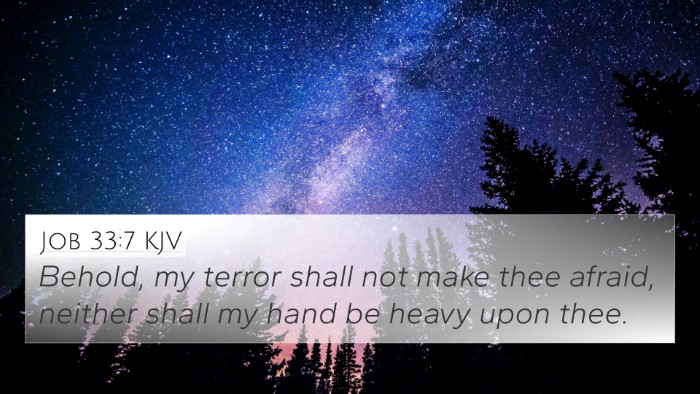Understanding Job 9:34
Job 9:34 states: "Let him take his rod away from me, and let not his fear terrify me." This verse captures the essence of Job's plea for relief from the overwhelming presence of God and His judgment. In this context, Job is expressing a desire for a mediator to bridge the gap between him and the divine scrutiny he feels.
Contextual Overview
The Book of Job wrestles with profound themes of suffering, divine justice, and humanity's struggle to understand God's ways. Job, a righteous man, faces immense suffering and questions the nature of God's governance.
Commentary Insights
- Matthew Henry: Job's request for God to remove His rod symbolizes Job's feeling of being under constant inspection and judgment. Henry emphasizes that Job seeks a more personal relationship with God—one where he does not feel oppressed by fear. He also notes the thematic significance of a mediator in approaching God.
- Albert Barnes: Barnes highlights that Job's statement reflects his desire for relief from divine wrath. He points out that fear of God's judgment can be overwhelming, and thus Job seeks a way to engage with God that does not involve constant terror. He interprets this as a deep longing for mercy and understanding from the divine.
- Adam Clarke: Clarke elaborates on the metaphor of God’s rod, indicating discipline rather than punishment. He draws attention to the emotional turmoil Job experiences, suggesting that the fear that Job refers to signifies a more profound spiritual conflict rather than mere apprehension of physical suffering.
Thematic Connections
Job 9:34 can be linked with numerous biblical themes and scriptures that address the relationship between God and humanity, divine justice, and the need for mediation:
- 1 Timothy 2:5: "For there is one God and one mediator between God and mankind, the man Christ Jesus." This verse reflects the need for a mediator, paralleling Job’s plea.
- Hebrews 4:16: "Let us then approach God’s throne of grace with confidence, so that we may receive mercy and find grace to help us in our time of need." This emphasizes the importance of confidence in God's grace, contrasting Job's fear.
- Psalms 103:9–10: "He will not always accuse, nor will he harbor his anger forever; he does not treat us as our sins deserve." This verse reassures believers of God's mercy versus His judgment, reflecting Job’s longing for understanding.
- Romans 8:1: "Therefore, there is now no condemnation for those who are in Christ Jesus." This affirmation of release from condemnation resonates deeply with Job's desire for relief from fear.
- Job 16:21: "Oh, that a man might plead with God, as a man pleads for his neighbor!" Job’s yearning for dialogue with God mirrors his request in 9:34.
- Isaiah 53:5: "But he was pierced for our transgressions, he was crushed for our iniquities." This prophecies of Jesus as a mediator illustrate the ultimate compassion that Job desires.
- Micah 6:8: "He has shown you, O mortal, what is good. And what does the Lord require of you? To act justly and to love mercy and to walk humbly with your God." This speaks to the relationship between fear, justice, and mercy.
- Psalm 34:18: "The Lord is close to the brokenhearted and saves those who are crushed in spirit." This verse assures hope and reflects Job's emotional state.
- James 4:10: "Humble yourselves before the Lord, and he will lift you up." This suggestion of humility aligns with the recognition of human frailty before God.
- Matthew 11:28: "Come to me, all you who are weary and burdened, and I will give you rest." This call for rest complements Job's request for alleviation from his suffering and fear.
Cross-Referencing Biblical Texts
In biblical interpretation, cross-references allow deeper understanding and richer context. Below are insights on how Job 9:34 relates to broader themes:
- Divine Mediation: Job expresses a desire for mediation, a theme that traverses the entire biblical narrative from Job to the New Testament where Christ acts as the mediator.
- Human Suffering: The consistent struggle of humanity facing divine scrutiny can be traced through various texts, providing a collective understanding of suffering and redemption.
- God's Justice and Mercy: The balance between justice and mercy is a common thread that binds the Old and New Testament, evident in both the life of Job and in Christ’s love for humanity.
Using Bible Cross-Reference Tools
To explore the connections and deeper meanings within Job 9:34, one can utilize various tools for Bible cross-referencing:
- Bible Concordance: Indexes the occurrences of words and phrases, aiding in thematic study.
- Bible Cross-Reference Guide: A roadmap to navigate connections between scriptures.
- Cross-Reference Bible Study: An analytical method that relies on comparing related verses to grasp comprehensive biblical truths.
- Bible Chain References: A technique of linking verses based on biblical themes and messages.
- Comprehensive Bible Cross-Reference Materials: Resources that provide detailed connections between various scriptures for deeper analysis.
Conclusion
Job 9:34 encapsulates a profound moment of human longing for divine understanding, underscoring the complexity of God's relationship with humanity. Through cross-referencing and detailed biblical analysis, we can uncover the layers of meaning in this poignant text. The overall theological implications remind us of our shared need for grace, mercy, and a mediating figure who understands our plight.











